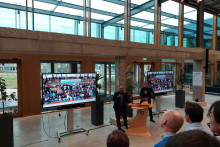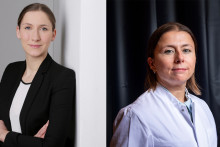A large section of the House of Representatives wants to curtail the internationalisation of research universities and universities of applied sciences. Many parties believe that, for a start, there should be fewer English-taught programmes.
In late January, they supported a notable motion calling on the government to develop a plan with higher education institutions, within eight weeks, aimed at quickly reducing the number of English-taught programmes. The plans were to include concrete measures ‘that each individual institution will take to severely curtail the proportion of programmes taught in English’.
Own plans
University association UNL (Universities of the Netherlands) and the Netherlands Association of Universities of Applied Sciences (Vereniging Hogescholen) have meanwhile sent their own plans, based on self-regulation, to Dijkgraaf, setting out how they intend to manage internationalisation on their own. They did so in anticipation of a bill that Dijkgraaf is currently drafting.
Overall, the plans address the influx of international students and the range of Dutch-taught programmes available. The universities want to create a Dutch-language track within all major English-language undergraduate programmes, for example, while a small number of programmes will be taught entirely in Dutch again.
Universities of applied sciences have promised to cut back their recruiting activities abroad. Their plans will see them introduce a fixed upper limit for the intake of international students for degree programmes in economics at their institutions.
‘Resolved’
However, they are not providing a list of measures taken by individual higher education institutions. According to Dijkgraaf, they are under no obligation to do so. In his view, the adoption of the two umbrella organisations’ national self-regulation plans effectively resolves the motion passed by the House of Representatives.
Dijkgraaf recognises and appreciates the higher education institutions’ intentions in his response. ‘These intentions have yet to be discussed with the participation councils of the individual institutions’, he explains, ‘but may have the effect of reducing the proportion of undergraduate programmes fully taught in other languages from 30% to 21%’.
Dijkgraaf prefers effective self-regulation over stringent national policy. This is in light of the differences between regions: international students may be desperately needed in areas where enrolment numbers are declining. Added to this, some sectors may need more international students than others.
Increased
The international student population has increased significantly in recent decades. Currently, 31% of first-year students enrolled in university Bachelor’s programmes are international students. This compares with 11% at universities of applied sciences.







